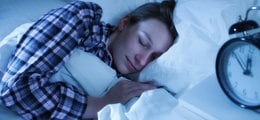Sleep Disorder Services

Tidelands Georgetown Memorial Hospital’s sleep center offers a comfortable environment when you need a sleep study to help diagnose sleep disorders.
Study in Comfort

Considering a sleep study?
Find out everything you need to know about a sleep study procedure using our Tidelands Health library.
Read more.
For a sleep study at the sleep center, you are in a private room so you can prepare for sleep as you do at home. A technologist monitors your sleep patterns through the night.
Our state-of-the-art equipment helps ensure we provide high quality studies to help accurately diagnose sleep disorders. A good quality sleep study allows your physician to get to the root of your sleep disorder, treat it and help you lead a more productive, rewarding life. In the case of sleep apnea, proper diagnosis could be life-saving.
Sleep Disorders
The most common sleep disorders include:

Tired? Your fatigue could be a sign of undiagnosed sleep apnea
Ask Neal Lilly about the impact of sleep apnea, and he’ll recount the story of a young father who was so tired throughout the day he struggled to muster the energy to play with his kids when he got home.
Read more.
- Sleep apnea - A person’s breathing is interrupted during sleep and causes him or her to wake up many times during the evening. It is most common in men, people who are overweight or obese, smokers and people over age 65. Long-term untreated sleep apnea can increase the risk of high blood pressure, heart attack, stroke and other complications.
- Insomnia - People with insomnia have difficulty falling asleep, wake up during and have trouble returning to sleep, wake up too early or generally have poor quality sleep. Behavioral modifications or techniques such as relaxation therapy can often correct insomnia.
- Restless leg syndrome - Leg discomfort (pain, pulling or other sensations) causes people to wake up frequently during sleep.
- Narcolepsy - Even after sleeping, individuals with narcolepsy have excessive daytime sleepiness and may fall asleep at inappropriate times and places.
What can you do about sleep disorders?
If you have difficulty getting quality sleep, speak with your primary care physician. Primary care doctors can thoroughly assess you and make sure your sleep difficulty is not being caused by other health-related issues.
Tidelands Health sleep lab services are operated in partnership with MedBridge Healthcare.
A physician referral is required to have a sleep study performed at the sleep center.
Take the “REST” test
Take the “REST” test to determine if you should seek medical attention for sleep problems:
- R= Are you rested and refreshed when you awake?
- E= Do you have excessive daytime sleepiness?
- S= Do you snore?
- T= How much time are you sleeping?
How is a sleep study conducted?
If a sleep disorder is suspected, your physician may recommend you undergo a sleep test called a polysomnogram. You will spend the night at a sleep center and electrodes and other monitors are placed on your scalp, face, chest, limbs and finger. The painless, non-invasive test measures brain activity, eye movements, muscle activity, heart rate and rhythm, blood pressure, air moving through your lungs and the amount of oxygen in your blood.
How is sleep apnea treated?
Your physician may encourage you to wear a continuous positive airway pressure, or CPAP, while you sleep. This machine gently blows air through a mask worn over the mouth and nose to prevent airways from being narrowed or blocked during sleep. Medications can also be prescribed for patients with sleep disorders.